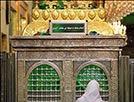Section 14-Brotherhood
- Details
- Hits: 3499
Section 14
Brotherhood
--------------------------------------------------------------------------------
Allah, the Wise, has said:
اÙنَّماَ الْمÙؤمÙÙ†Ùونَ اÙخْوَةٌ
(The believers are but brethren)[129]
Imam Baqir (a.s.) said:
عَلَيكَ بÙاÙخْواَن٠الصّÙدْق٠ÙَاÙنَّهÙÙ… عÙدَّةٌ عÙندَ الرَّخاَء ÙˆÙŽ جÙنَّةٌ عÙندَ الْبَلاَء
(It is incumbent) upon you to take true friends for yourself, for they are an asset, in times of ease and a shield, during adversities[130]
Short Explanation:
At any age, brotherhood and friendship are necessary for someone, who is worthy of them. Allah has not bestowed upon His servants a bounty more important than success in keeping and associating with religious friends.
But do you not observe that the primary Grace which God granted to the Prophets at the time of their Prophethood was a friend, brother and wali? It is apparent from this that after the bounty of cognizance of God and His Prophets, there is no bounty more pure and pleasant than brotherhood in the path of God and a righteous friend.
One ought to refrain from entering into friendship and brotherhood with those, who seek these alliances out of avarice or worldly motives. A few brothers (in religion) who possess great cognizance, are better than numerous ones who lack this attribute.[131]
1 – A Mu’min is the Brother of Another Mu’min
Imam Baqir (a.s.) related:
Once, a group of Muslims had set off on a journey, but in the course of their travel, they lost their way. Their supplies were soon exhausted and they were overcome by intense thirst.
(With no water in sight and imagining their end to be near) they put on their shrouds and sat down, resting themselves against the trees.
Suddenly, an old man in white apparels approached them and said:
“Arise, for you have nothing to fear. Here is some water for you.”
They scrambled for the water and drank to their fill after which, turning to the old man, they said, “May God have mercy upon you! Who are you?”
“I belong to the Jinn community, who had pledged allegiance to the Holy Prophet (s.a.w.). I had heard him say: ‘A Mu'min is the brother of another Mu'min. He is his eyes and his guide (too).’ I could not allow you to die of thirst, while I was here.”[132]
2 – Bond of Brotherhood
Muhammad Ibn A’jlaan narrates:
I was in the company of Imam Sadiq (a.s.) when a man, from a distant city, arrived and greeted the gathering.
“How were your brothers when you took leave of them?” the Imam (a.s.) asked him.
The man spoke well of them and praised them a great deal. The Imam (a.s.) then questioned, “Do the rich visit the indigent ones when they fall sick?”
He said that they seldom did.
The Imam (a.s.) carried on, “Do the rich seek to know the condition of the impoverished ones?”
“Rarely” answered the man.
“Do the affluent ones help out the poor and the needy?”
The man responded, “You speak of attributes, which are rare amongst our people.”
The Imam (a.s.) remarked, “How then do these people consider themselves to be (our) Shiites (when there exists no bond of brotherhood between the affluent and the impoverished ones).”[133]
3 – At the Door of a Brother
Imam Baqir (a.s.) said:
An angel was once passing by a house, when he witnessed a man standing near its door. The angel questioned him, “Why do you stand here?”
“This is the house of my brother and I wish to greet him,” answered the man.
The angel asked, “Is he of your kith and kin or is it that you are in need of his help that you have come to pay him a visit?”
“The reality is not as you make it out to be. We are just brethren in faith and I only wish to meet him and greet him for the sake of God”.
“I am God’s messenger towards you,” the angel said. “He has sent you His greetings and has said: O’ My Servant! You have paid Me a visit and desired My pleasure and so, as a reward for upholding the rights and sanctity of religious brotherhood, I have made Paradise compulsory for you and have distanced you from My fire and wrath.”[134]
4 – The Benevolent Governor
An inhabitant of the city of Rey, narrates:
One of the scribes of Yahya Ibn Khaalid was appointed as governor of Rey. I had some taxes to pay and feared that the new governor would extract it from me, for in such a case, I would face very difficult times. Some of my friends informed me that he was a follower of the holy Imams (a.s.), but I was fearful that if it was not so, he would not hesitate to put me behind bars.
With the intention of performing Hajj, I presented myself in the presence of Imam Musa Kadhim (a.s.) and informed him of my predicament. The Imam (a.s.) wrote a letter to the governor, the contents of which were as follows:
In the name of God, the Most Beneficent, the Most Compassionate. Do know that beneath the A’rsh (Throne) of God, there exists a shade of Mercy into which none shall enter except he who exhibits goodness and kindness towards his brother-in-faith, liberates him from his sorrow and endeavours to make him happy. Behold! The bearer of this letter is one of your brethren. Wassalaam.
After returning from Hajj, one night I proceeded to the governor’s house and asked the sentry to tell the governor that a person had brought a message from Imam Kadhim (a.s.).
As soon as he was informed, the governor rushed out towards the door in sheer delight. He was barefooted and took me into his arms, repeatedly kissing my forehead and inquiring after the Imam’s well being.
Having gone through the Imam’s (a.s.) letter, he gave me half of all the money and clothes he possessed, and as for the things which could not be divided, he gave me the monetary equivalent of half its value, asking me after each distribution:
“Have I made you happy?”
I would reply, “By God! You have pleased me greatly.”
He took out his register and erasing all the debts written across my name, handed me a letter which contained an order, exempting me from all taxes.
I took his leave and said to myself, “This person has been immensely kind to me and there is no way I can repay his munificence. Let me go for Hajj again and pray for him there and also inform the Imam (a.s.) of his generosity and kindness.”
That year I started out for Makkah and presenting myself before the Imam (a.s.), informed him of what had transpired. As I narrated the events, I observed that his face continually brightened up with delight and so I inquired:
“Have his deeds pleased you?”
He said, “By Allah! His deeds have truly pleased me and he has (also) pleased God, the Holy Prophet (s.a.w.) and Amirul Mu'mineen (a.s.).”[135]
5 – A'li (a.s.), the Brother of the Holy Prophet (s.a.w.)
One of the extremely significant steps undertaken by the Holy Prophet (s.a.w), five or eight months after his migration to Madinah, was to establish the bond of brotherhood between the Muhaajir (The Emigrants) and the Ansaar (The Helpers).
A'bdullah Ibn A'bbas says:
When the verse اÙنَّماَ الْمÙؤمÙÙ†Ùونَ اÙخْوَةٌ (The believers are but brethren)[136] was revealed, the Holy Prophet (s.a.w.) proclaimed brotherhood to be a general law amongst the Muslims and, taking into consideration their ranks and positions, established the bond between every two persons by making one the brother of the other; Abu Bakr with U'mar, U'thman with A'bd al-Rahmaan and so on.
Amirul Mu'mineen (a.s.) had stretched himself on the ground, when the Holy Prophet (s.a.w.) approached him and said:
“Arise, O’ Abu Turaab! By God! I have not made you the brother of anyone for I have kept you for myself.”[137]
Notes:
[129] Holy Qur'an, ch. Al-Hujaraat (49), vs. 10.
[130] Bihaar al-Anwaar vol. 78, pg. 251.
[131] Tadhkirah al-Haqaaiq, pg. 52.
[132] Al-Kafi, vol. 2, ‘The Chapter of Brotherhood of the Mu'mineen’, tr. 10.
[133] Al-Kafi, vol. 2, ‘The Chapter of The Right of a Mu'min upon his brother’, tr. 10
[134] Namunah-e-Ma'arif, vol. 1, pg. 81; Jaame’ al-Akhbaar, pg. 118.
[135] Pand-e-Taareekh, vol. 2, pg. 47; Bihaar al-Anwaar vol. 11, ‘The Biography Of Imam Kadhim (peace be upon him)’.
[136] Holy Qur'an, ch. Al-Hujaraat (49), vs. 10.
[137] Namunah-e-Ma'arif, vol. 1, pg. 82; Kashf al-Ghummah; Tafseer al-Burhaan.











